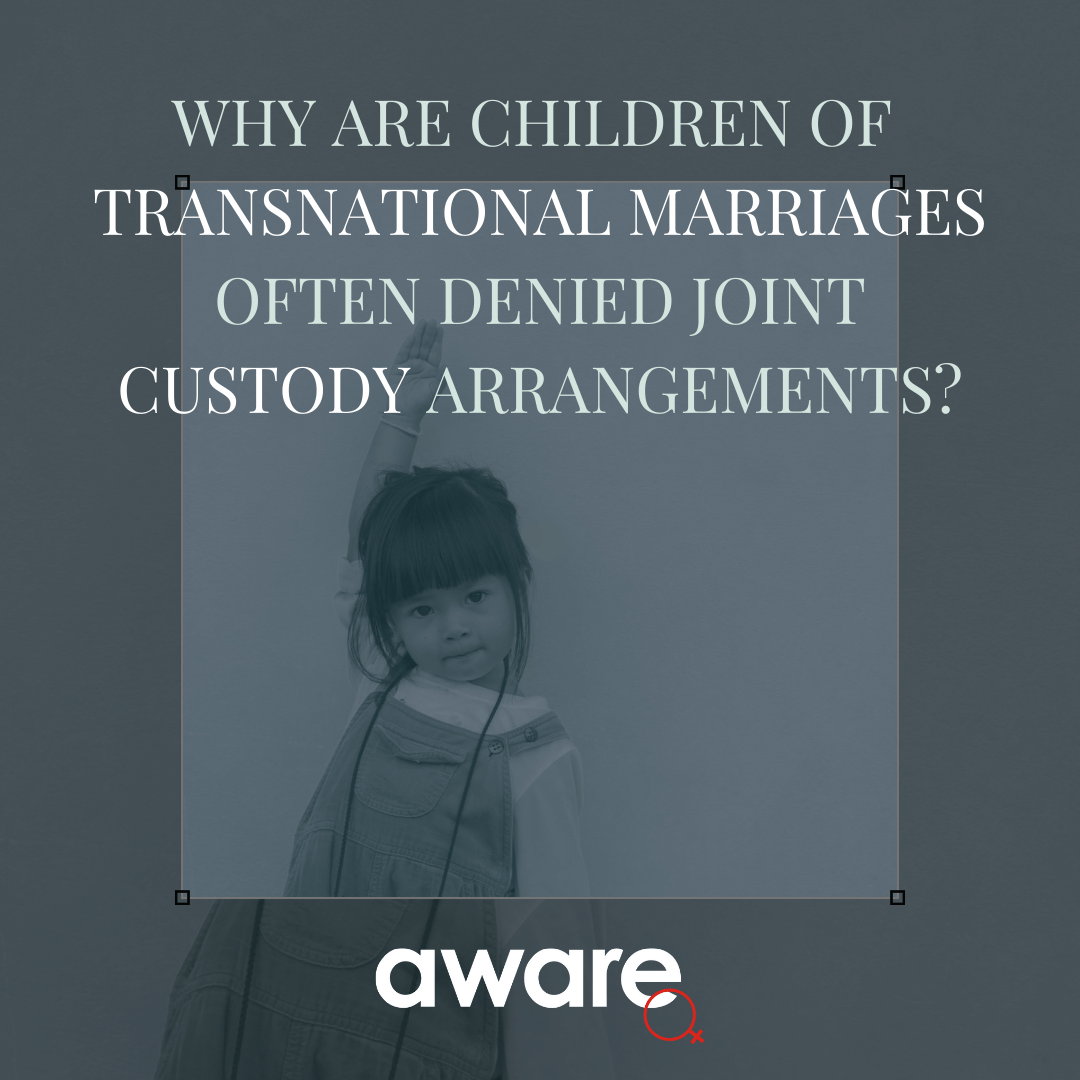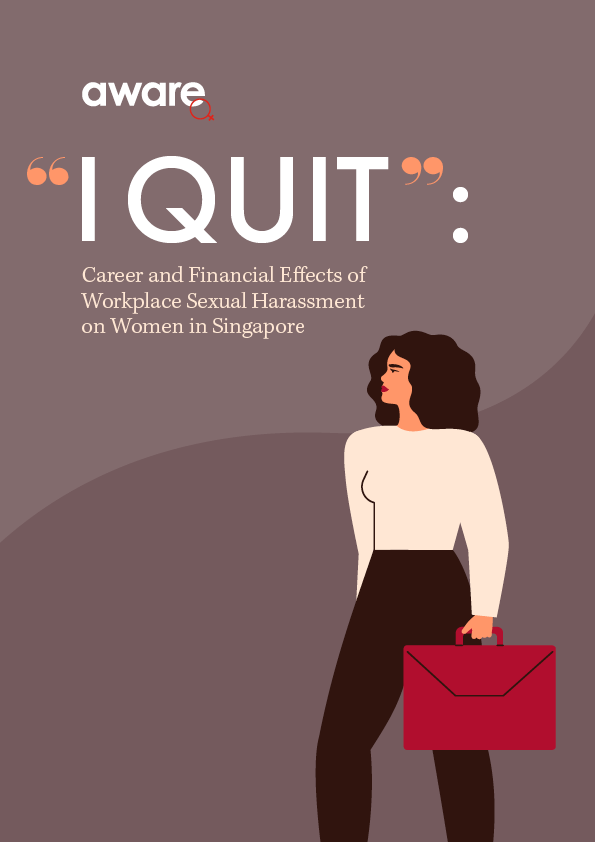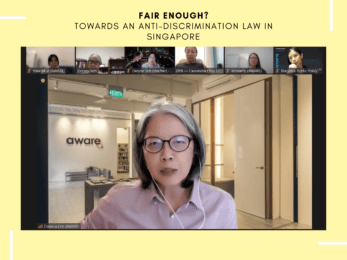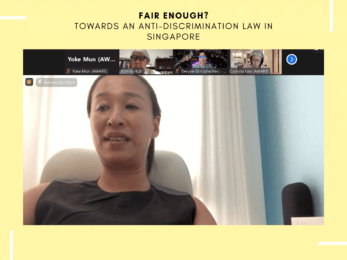This op-ed was originally published in The Straits Times on December 24 2021.
For three in 10 victims of workplace sexual harassment who report their experiences, instead of setting them on a path to justice and recourse, it ends up triggering some form of retaliation – from perpetrators, employers and/or peers.
That was a disconcerting new finding from a study, I Quit, by gender advocacy group Association of Women for Action and Research (Aware) released earlier this month. I Quit is a qualitative research report on the career and financial impact of workplace sexual harassment on women in Singapore.
Whether done to protect an organisation’s image, send a message that complaints are unwelcome or ensure that employees’ attention remains on their work, retaliation makes an already difficult situation even more deplorable for harassment victims. It compounds the trauma already suffered from the harassment itself and contributes to feelings of isolation, helplessness and distrust.
For this reason, when thinking about how to protect workers in Singapore from workplace sexual harassment, an essential part of the equation involves protection from retaliation. Without that, it’s hard to imagine workplaces being truly safe, transparent and fair in their functioning. So, what more can be done to protect them?
Work-related retaliation
What does retaliation look like? Clear-cut scenarios might involve a survivor being fired for not being “a good fit” two weeks after reporting that her manager sexually harassed her. In reality, however, employers tend to use more subtle tactics to escape detection.
Reena (not her real name), who worked in finance, was verbally harassed by a key stakeholder at her company. On reporting this, her manager started unrealistically shortening her work deadlines. Tasks ordinarily requiring two weeks to complete were expected to be done within three days, and she could not discern any justification for this change.
Other forms of retaliation that women experience include denial of benefits or promotions, unfair performance reviews, dismissal and sudden disciplinary action.
Another I Quit respondent, Mei Ling (not her real name), who worked in a school, experienced verbal sexual harassment by a colleague and filed a report with the help of her supervisor. However, instead of treating the report with seriousness and investigating her complaint, the school principal made allegations that surprised her. “Teachers are ranked and, at that point, I was being ranked unfairly,” she said. “There were accusations made about my professionalism… The principal insisted that I didn’t go into class when I didn’t feel like it, which was not true.”
As one might expect, retaliation in the form of adverse work-related actions is typically perpetrated by those with more power than the victim in the organisational hierarchy. A study which surveyed 1,167 United States federal employees found that employees with lower status within their organisations experienced higher rates of retaliation for reporting harassment.
Social retaliation
In addition to these work-related actions, I Quit found another set of retaliatory behaviours: ostracism, name-calling and blame. These are less tangible than direct work-related actions and typically originate from peers or subordinates.
In some cases, retaliation is experienced in the form of ostracism alone. One respondent, a non-profit employee who was subject to multiple inappropriate sexual comments from colleagues, said that after disclosing her experience, “a lot of the middle management who were on the same level as me didn’t really speak to me as much any more… I wasn’t involved in a lot of important things”.
For others, such as Sada (not her real name), a tech employee who experienced verbal and online sexual harassment, social retaliation took on a combination of ostracism and name-calling: “I could hear people, murmuring and echoing around me, ‘This is a troublemaker’… No one wanted to speak with me any more.” The few co-workers who did speak with her told her that she “shouldn’t have reported the harassment at all”, expressing a commonly held assumption that non-physical sexual harassment isn’t really serious – “(the perpetrator) did not even touch you, so why did you report it?”
Experts suggest that social retaliation may be more pervasive because of its relative social acceptability. After all, there’s nothing overtly threatening about ostracism – it may be dismissed as personal preference (“not everyone in the workplace gets along”) or even unintentional omission (“I forgot to invite them for a work meeting”).
However, such retaliation strikes at the heart of the human need to belong. While work-related actions alter material aspects of a victim’s job, social retaliation alters her interpersonal relations at work, which can affect her productivity, job satisfaction and ultimately her desire to continue in her role.
Effect on sexual harassment reporting
Retaliatory action silences and isolates victims by discouraging them from filing formal reports, confiding in their colleagues and, often, seeking any help at all. In fact, research suggests that employers do not even need to perform retaliation to deter reports – the mere threat of retaliation is enough. I Quit found that the fear of retaliation alone discouraged another two in five harassment victims from making reports.
Although there is not much Singapore-specific data on retaliation, studies in other countries show that these fears are not unfounded. A US-based research study that analysed all sexual harassment complaints filed with the US Equal Employment Opportunity Commission and state Fair Employment Practices Agencies between 2012 and 2016 found that about two-thirds of people who reported workplace sexual harassment to a state or federal agency experienced negative consequences at work.
In fact, a strong correlation exists between instances of sexual harassment and negative consequences at work: Research has shown that the more frequently mistreatment occurs in a given workplace, the more frequently victims encounter retaliation, both professional and social, for speaking out.
What does this mean for Singapore’s workplaces and workers? Obviously, harassment in the workplace can’t be properly addressed when an abundance of incidents go unreported. Beyond that, though, not reporting one’s harassment is also associated with health-related costs such as increased risk of anxiety, depression and diminished psychological well-being. Under-reporting also prevents employers from taking early action against workplace harassment.
Taking action
The Tripartite Advisory on Managing Workplace Harassment helpfully lays out the principle of non-retaliation in its guiding principles for employers: “The reporting informant must not be victimised by the employer following the making of such a report.”
Employers can certainly build on this principle to draft a robust anti-retaliation policy, but since the number of employers in Singapore who have adopted the Tripartite Advisory is not tracked, it is impossible to estimate how many offer protection from retaliation.
Employers and employees alike need more information on retaliation, particularly the different forms it can take, its consequences and how best to tackle it. For example, the advisory should clarify whether a victim who has already filed a sexual harassment complaint can also file a separate complaint for retaliation. Similarly, what consequences are borne by employers found culpable of retaliating or encouraging retaliation, intentionally or otherwise? This should also be clarified.
The Tripartite Standard on Grievance Handling, which provides guidance on the management of employee dissatisfaction or complaints, including workplace harassment, had been adopted by only 1,200 employers, or 0.4 per cent of all business entities in Singapore, in 2019.
Meanwhile, the Tripartite Guidelines on Wrongful Dismissals protects against retaliation when an employer dismisses an employee to punish the employee for exercising his or her employment right – such as filing a mediation request, or declining a request to work overtime.
However, it doesn’t provide protection from types of retaliation that do not end up in dismissal but are nevertheless professionally, psychologically and physically insidious.
The Government should introduce national legislation that explicitly protects against retaliation, to deal with workplace sexual harassment and mandate that employers implement well-defined sexual harassment policies and gender-sensitive training.
The oft-cited concern that decisive action against harassment or retaliation will lead to heightened litigiousness in the workplace needs to be put aside – it does not justify turning a blind eye to harassment victims’ protracted punishment.
Shailey Hingorani, Head of Research and Advocacy, AWARE










